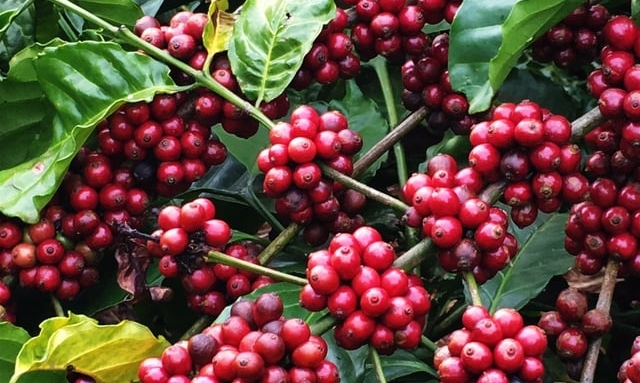November 24, 2025 | 18:33 GMT +7
November 24, 2025 | 18:33 GMT +7
Hotline: 0913.378.918
November 24, 2025 | 18:33 GMT +7
Hotline: 0913.378.918

Many experts look positively at the coffee export target of 5 billion USD in 2024.
In early 2024, coffee prices continued to increase, which is an advantage for exporting countries like Vietnam. According to the Mercantile Exchange of Vietnam (MXV), the robusta coffee contract price in January 2024 ended the session on January 16 at USD 3,435 per ton, setting a new peak in 28 years. Along with that, the cost of green coffee in Vietnam also set a record, now exceeding the mark of VND 72,000 per kg.
Mr. Do Ha Nam, Chairman and General Director of Intimex Group, said that in early 2024, Vietnam's coffee export turnover grew impressively partly thanks to record high selling prices, reaching VND 100,000 per kg in recent days. With current developments, the coffee export target of USD 5 billion this year is relatively easy.
Mr. Nguyen Quang Binh, a coffee market analyst, also said that the turnover achieved in the first quarter, plus the amount of coffee that will be exported in the remaining three quarters at a price of over USD 3,000 per ton, the coffee industry is considered to have reached 5 billion USD this year.
Mr. Nguyen Xuan Dinh, Vice Chairman of the Vietnam Farmers' Union, emphasized the need to improve farmers' farming skills. Mr. Dinh said there have been good production and training programs for businesses and scientists. However, these programs are few, and farmers must learn more independently after training.
Another critical issue is that the production link must ensure sustainability. There are already a few completed models in the country, but only a few. In many countries, enterprises and corporations operate within the organization of cooperatives or Farmers' Associations. That means the stages are linked in the same system.
In the country, many linked chains still find directions for enterprises to sign with cooperatives, and then cooperatives link with farmers. "Each step is still fragmented and not yet a whole block," Mr. Dinh shared.
Mrs. Cao Xuan Thu Van, Chairwoman of the Vietnam Cooperative Alliance, said that the country has less than 1,000 coffee cooperatives out of more than 900,000 cooperatives. However, many coffee cooperatives need help with consumption because the cooperative has to take on too many different tasks and needs to know who to go with.
Experts in the coffee industry also believe it is necessary to promote stages from production, processing, and branding to market development to increase value and ensure the sustainable development of Vietnam's coffee industry.
According to Mr. Le Thanh Tung, Deputy Director of the Department of Crop Production, a systematic strategy for developing high-quality coffee is needed to improve competitiveness in the international market.
Vietnam has up to 1 million households participating in producing over 660,000ha of coffee, but the connection between coffee growers still needs to be more cohesive. Over the years, Vietnam has changed its seed and production practices to maintain coffee quality. But more is required. According to domestic and world requirements, Vietnamese coffee must meet quality standards and be grown on deforested land.
Mr. Tung said the upcoming solution is more than a matter of technique, finding markets, or increasing processing. "The solution that must be proposed needs to help producers and exporters achieve harmony between personal and national interests and promote the value chain for coffee beans," Mr. Tung shared.
Translated by Tuan Huy

(VAN) Hue City is accelerating efforts to combat IUU fishing, aiming to remove EC’s 'yellow card' and promote sustainable fisheries development.

(VAN) The recent torrential downpours and unprecedented flooding in the Southern Central Coast are a highly unusual meteorological and hydrological event.

(VAN) The Southern Central Coast and Central Highlands regions have suffered massive agricultural losses, with over 80,000 hectares of rice and crops, alongside millions of livestock, being swept away, causing severe damage to farmer livelihoods.

(VAN) Trieu Son commune deploys a 'virtual assistant' to help residents complete administrative procedures.

(VAN) Applying green technology in rural water supply and sanitation helps improve resource efficiency, protect the environment, and enhance community living standards.

(VAN) Developing biosecure livestock production is the key that helps Tuyen Quang form linked chains in livestock production and build its brand in the market.

(VAN) During his bilateral activities in South Africa, Prime Minister Pham Minh Chinh welcomed Vice President of the South African Chamber of Commerce and Industry Neil Pollock.